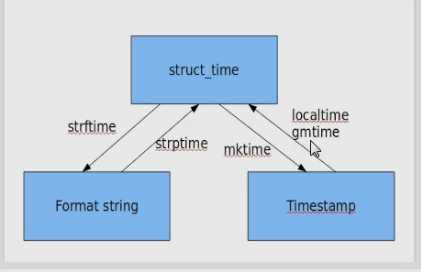标签:ice alt rand def 世界时间 now() orm sel ctime
调用模块
qqq.py
def t():
print("t")
print(globals())
ppp
import qqq
if __name__=="__main__":
print(globals())
此时import qqq会输出
‘__name__‘: ‘qqq‘
但是qqq的__name__ 会是__main__
所以 只有运行的py的 __name__才会是__main__ 所以被调用模块的__name__不一样
所以if __name__=="__main__":被用作程序的开始
time模块
time.time():返回当前时间的时间戳
1569576871.098338
将一个时间戳转换为当前时区的struct_time,即时间数组格式的时间
time.localtime()
my = time.struct_time(tm_year=2019, tm_mon=9, tm_mday=27, tm_hour=17, tm_min=32, tm_sec=56, tm_wday=4, tm_yday=270, tm_isdst=0)
取年
my.tm_year
取月
my.tm_mon
取天
my.tm_mday

结构化时间变成时间戳
time.mktime(time.localtime())
1569577123.0
#结构化转化为文字时间
#字符串可以自定义“%Y-%m-%d %X”
print(time.strftime("%Y-%m-%d %X",time.localtime()))
#字符串时间转化结构化
print(time.strptime("2016:12:24:17:50:24","%Y:%m:%d:%X"))
#asctime 把结构化时间变成固定的时间
print(time.asctime())
‘Fri Sep 27 17:41:40 2019‘
print(time.ctime())
Fri Sep 27 17:41:45 2019
datetime
import datetime
print(datetime.datetime.now())
2019-09-27 17:42:27.648439
#获取当前世界时间 b=datetime.utcnow() print(‘世界时间:‘,b)
from datetime import datetime
m=datetime.now()
print(m.strftime(‘%Y-%m-%d‘))
2019-09-27
print(m.strftime(‘今天是这周的第%w天‘)) print(m.strftime(‘今天是今年的第%j天‘)) print(m.strftime(‘今周是今年的第%W周‘)) print(m.strftime(‘今天是当月的第%d天‘))
random 随机模块
random.random()用于生成一个0到1之间的随机浮点数:0<=n<=1
>>> random.random()
0.7086588033796296
random.randint(a,b)用于生成一个指定范围内的整数:a<=n<=b;
10
random.randrange
random.randrange([start],[stop],[step])从指定范围内,按指定基数递增的集合中获取一个随机数。等于random.choice(range([start],[stop],[step]))
random.choice([1,2,3,4])
2
random.choice(["a",‘b‘,‘c‘,‘d‘])
‘b‘
random.uniform
random.uniform(a,b)用于生成一个指定范围内的随机浮点数
>>> random.uniform(12,5)
6.128208009182529
random.suffle
random.shuffle(x[, random])用于将一个列表中的元素打乱
random.sample
random.sample(seq,k)从指定序列中随机获取指定长度的,且不重复出现的片段
random.sample(mylist,2)
[‘a‘, ‘b‘]
random.sample(mylist,2)
[‘d‘, ‘a‘]
标签:ice alt rand def 世界时间 now() orm sel ctime
原文地址:https://www.cnblogs.com/hywhyme/p/11599526.html